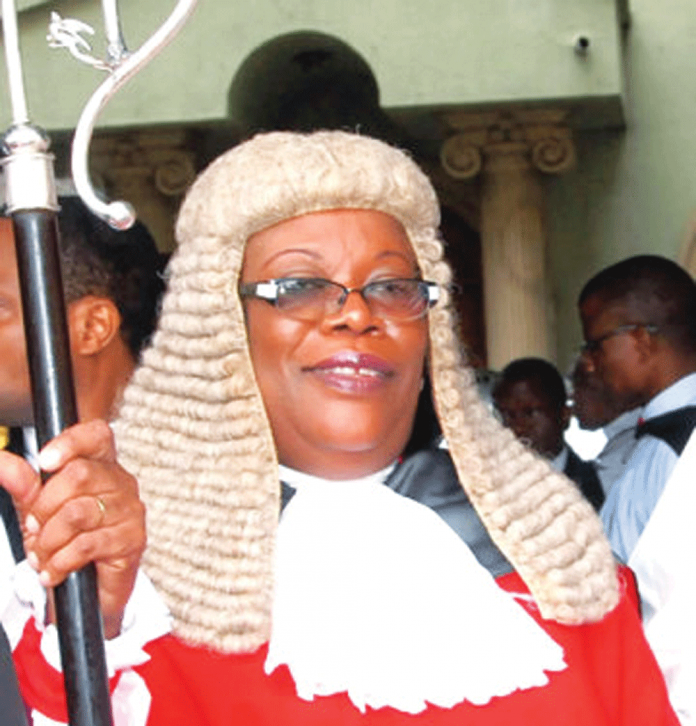Judges of the Lagos High Court recently went to Singapore for one week retreat, during which matters slated for hearing were postponed. Senior Correspondent, ONYEWUCHI OJINNAKA, sought the views of stakeholders on the essence of the trip, funding as well as the effect of the week-long absence of judges on litigants.
It has become a norm that at the commencement of a new legal year, judges of the Lagos State judiciary embark on a trip abroad for a retreat. Nobody is bothered about that, especially if the funding is borne by individuals; but when the trip is made at the expense of tax-payers’ money, it becomes an issue for discussion and scrutiny.
Recently, precisely from Friday, October 30, to Monday, November 9, proceedings at the Lagos High Court in all the judicial divisions were stalled due to the trip to Singapore by all the judges led by the Chief Judge, Justice Olufunmilayo Atilade. A lofty exercise indeed, but a critical analysis exposes its toll on the economy of the state, as well as the effect on litigants and lawyers.
However, the desirability of such exercise comes into focus when considering the problems and lapses that are prevalent in Nigeria’s judicial sector.
Stakeholders’ view
When TheNiche called some stakeholders in the judicial sector on phone to express their positions on the judges retreat abroad instead of having the retreat at home and save the hard currency for the growth of our economy, a lawyer, Ade Oyebanji, said there was nothing bad in judges going abroad for retreat, if doing so would improve the efficiency of the judiciary. He, however, advised that the exercise should not adversely affect the litigants, especially those facing criminal cases.
Arguing that there was need for continuous education of judicial officers especially the judges, he said such retreats help them to learn more and sharpen their skills.
“It is not a jamboree as such. The chief judge must have meant well for the judiciary, and so going to Singapore this year is to improve and fast-track the judicial process.
“We at the bar will as well benefit from the skills they acquired there when we have any matter before any of them.”
He pointed out that going abroad for retreat is not only peculiar to judicial officers or the judiciary, as national and state legislators also go abroad for retreats.
“Singapore was once like Nigeria, but now more advanced. Therefore, going there for a retreat, the judges will learn more on how to improve the judicial system here to meet with the standard in that country.”
Former Chairman of Nigerian Bar Association (NBA), Ikeja branch, Monday Ubani, seems to align with Oyebanji.
According to Ubani, “The issue of continuous legal education is very important. I do not see anything wrong in going for retreat abroad to be abreast of latest development in the judiciary.”
He however advised that such trips should be well planned in such a way that lawyers and litigants would know in order not to bring untold hardship to them.
“It should be factored in the programme of the judiciary to avoid untold hardship to lawyers and litigants,” he averred.
Commenting on local alternative for the retreat, Ubani submitted that it can be done locally to save the hard currency that would have been used. “But it is neither here nor there, so long as it is a programme designed to bring efficiency in the judiciary.”
Funding
Commenting on the funding for the retreat, Chairman of Judiciary Staff Union of Nigeria (JUSUN), Lagos State branch, Emmanuel Abioye, said spending in government circle or agency is based on budget. He added that there are ways of operation in government circles.
“Budgets are normally approved for such activities and therefore the trip of judges to Singapore for a retreat may have been accommodated in the budget. The government is aware of such exercise and therefore there is a budget for it,” Abioye stated.
When asked if Lagos judiciary has been granted the much agitated full financial autonomy in relation to the budget for the retreat, Abioye said: “We have not been given full financial autonomy. What we have is partial autonomy. We are still pressing for full financial autonomy for the judiciary as stipulated in the constitution. We are not relenting.”
Lawyers, litigants affected
While speaking to his client who was anxious about his case billed to be heard within the period of the judges’ absence, a lawyer lamented that “all these adjournments are becoming frustrating”.
Apparently, the counsel was not alone in the disappointment and frustration; there are many other lawyers and litigants out there who felt bad because their matters could not come up on the last adjourned date.
All causes slated for hearing within that week were inevitably adjourned. Counsel who were not aware of the judges’ trip went to court for their matter, but were informed by court registrars to take another date, as the court could not sit from October 30 to November 9 or thereabout due to absence of judges.
Nonetheless, counsel who were already aware went to the court to take another date, having informed their clients not to go to court.
Awaiting trial inmates whose matters were slated for trial had their hopes dashed, as the trial was shelved due to the Singapore trip.
A judiciary staff who pleaded anonymity suggested ways to ameliorate the plight of litigants, especially those on criminal charges, during such retreats. According to him, judges can go for the retreat in two batches. If Batch A goes for one week retreat, Batch B will stay back and hear urgent and criminal causes. And when Batch A comes back, Batch B will then proceed for its one week retreat while Batch A continues with urgent and criminal causes, the respondent added.
He argued that if the method is adopted, it would help in dealing with urgent and criminal matters, decongest the court of pending cases and enhance quick justice delivery.













